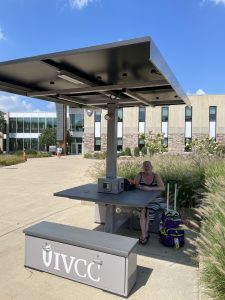Depression: ‘Being your own worst enemy’
IVCC provides resources and support.
November 2, 2017
The facts
According to the American College Health Association, 10% of American college students are so depressed that it is difficult to function. While some may think that depression is just a cry for attention, depression is a real mental illness that causes chemical imbalances in the brain and affects the lives of millions.
The American Psychiatric Association defines depression as “a common and serious mental illness” that negatively affects how an individual feels, thinks, and acts. Depression affects an estimated one in 15 adults in any given year, and women are more likely than men to experience depression.
Despite the fact that depression affects 6.7 percent of adults in any given year, depression is often discussed in hushed voices due to the stigmas associated with the disorder. Some may say that those who are depressed just need to drink more water or take a walk outside. This flawed rhetoric is toxic to those who suffer from depression, and IVCC is making an effort to put an end to this thinking.
IVCC celebrated “A Day Without Stigma” on Monday, Oct. 9 in the Student Life Center. The objective of the day was to “eliminate the shame and discrimination surrounding mental health disorders by creating communities of understanding, support and help-seeking.”
Participants distributed information about mental illnesses and made attempts to start meaningful conversations about mental health.
IVCC students share
Depression can affect anyone, including IVCC students. According to one IVCC student, depression creates many challenges for her at school.
“On bad days, I find it hard to get out of bed, hard to do my homework, hard to focus… Some days it is overwhelming and I just want to give up. Insomnia and anxiety also go hand in hand with my depression,” the student explained.
In order to manage her depression, she often turns to Project Success counselor Cynthia Cardosi, the Project Success staff and Disability Services Coordinator Tina Hardy.
“Cynthia Cardosi has helped me tremendously,” she said. “She has helped me succeed in my academic achievements, as well as been a great support system to me during some hardships I have faced. The whole staff at Project Success are great resources. Everyone there is always willing to give you a hand in anything you need.”
The student, who chose to remain anonymous for this article, believes that raising awareness about mental illness is crucial to eradicating the stigma.
“People often think you are broken instead of seeing [depression] as a mental illness. Depression is exhausting,” the student said. “Surround yourself with positive people. Ask for help when you need it. Understand your illness. Giving up should never be an option.”
For another student, school is both a relief from and a cause of depression. IVCC Sophomore Akari Oya explains that school creates routines that distract her “from being consumed by negative thoughts.”
“Having a routine of waking up at a certain time, interacting with others, and focusing on lectures or studying seems to ward those negative thoughts off,” Oya said.
However, the stress of school can also intensify the symptoms of depression for Oya.
“Having to think about or plan for my future plays a major role in my anxiety that leads to depression, and attending a community college is about having people constantly ask you, ‘Where are you transferring to?’” Oya explained.
According to Oya, depression can be misunderstood by anyone – even those closest to her.
“When I confessed to a close friend about my mental illness, he immediately denied it, declaring that I could not possibly be depressed since I was socially active, was successful in school, and had nothing to be sad about because I was living a seemingly content life,” Oya recalled.
“A depressed individual can laugh, interact, and seem to be happy just as much as a seemingly cheerful person can cry, have doubts, and be clinically depressed,” Oya said.
Oya wants to spread awareness about mental illnesses so that others understand that “depression is not about being lazy or being temporarily sad.” While Oya utilizes a variety of resources to cope with depression, her best advice for those who are depressed is to embrace their self-worth.
“If you are depressed, it is alright to be afraid because it truly is scary being your own worst enemy,” Oya said. “I wish I could give life-changing advice, but the best thing I can do now is fight with you. I recognize how difficult it is to convince a depressed individual of their self-worth, so let’s talk over tea instead.”
Where to get help
If you are depressed or think you may be depressed, there are many accommodations that you can apply for at IVCC.
Contacting IVCC’s Disability Services should be your first step, as their main goal is to “serve the needs of qualified students with disabilities by providing equal access to quality education, services and activities.”
Accommodations include, but are not limited to, calculator use on tests, note taking accommodations, extended test times and the use of spelling and grammar check on essays.
If you feel that you may benefit from any of these accommodations, contact Tina Hardy, Disability Services Coordinator, at 815-224-0284 or [email protected] to schedule an appointment.
Additional information, resources and tips can be found on the Disability Services’ website. Other campus resources include peer tutoring, the Writing Center and the Counseling Center.
Depression is one of the most treatable mental disorders. Illinois Valley Community College wants students to know that help is available for those who need it. Do not be afraid to ask.




